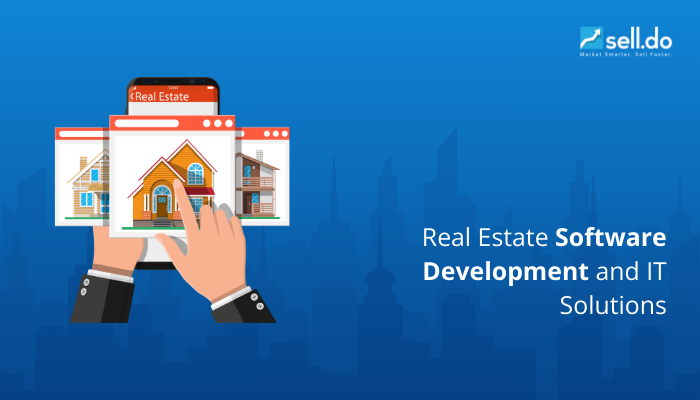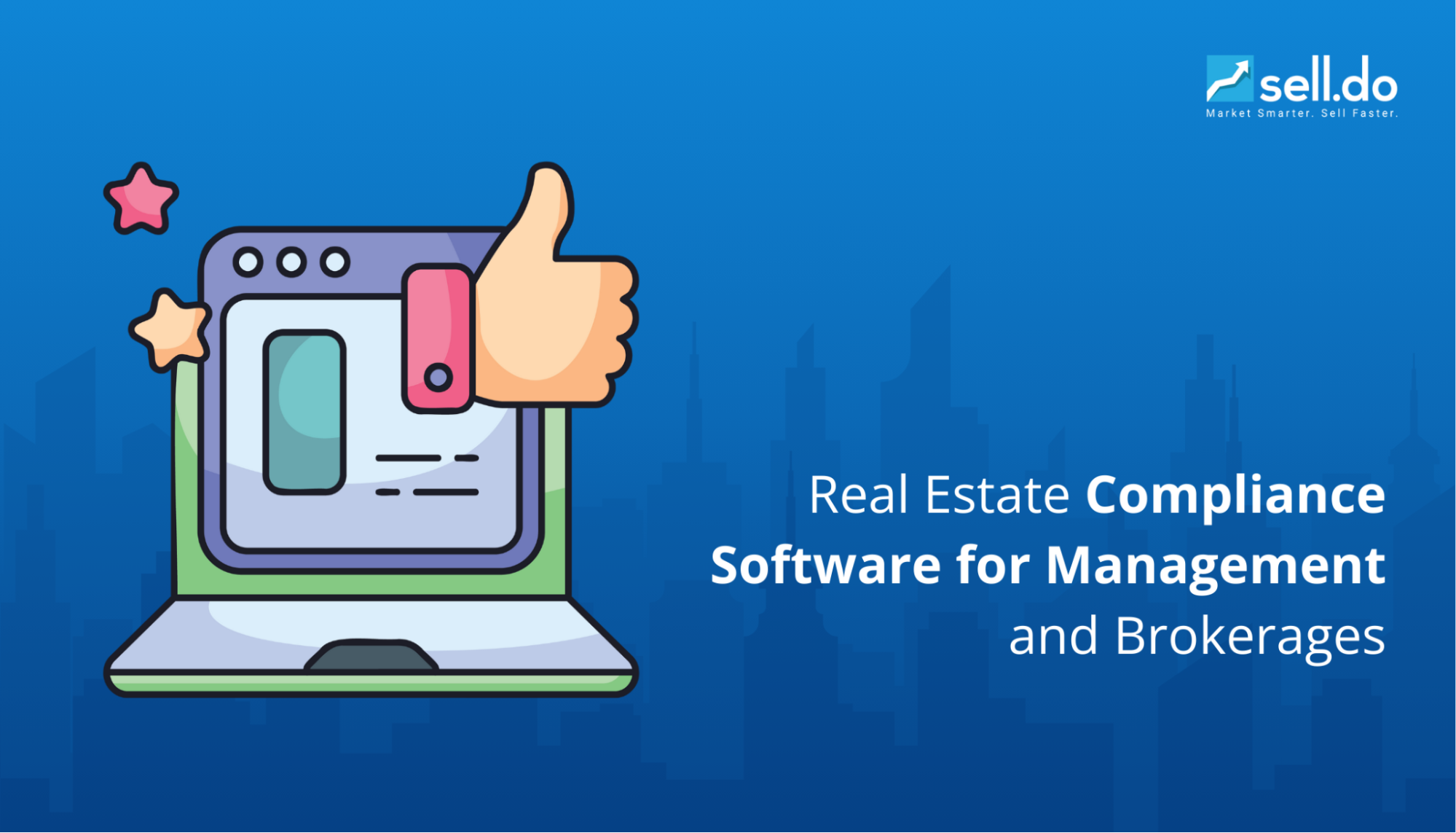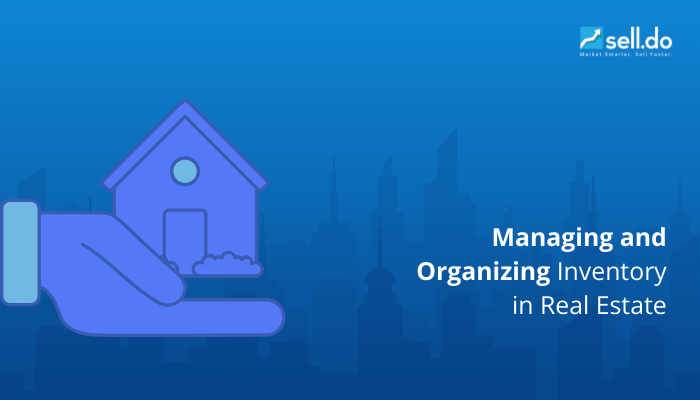Managing property sales, client interactions, and inventory across multiple projects isn’t easy—especially when everything depends on speed, accuracy, and timing. That’s where real estate software solutions come in. These tools are designed to simplify operations, bring more visibility to daily processes, and help you close deals faster with fewer errors.
If you’re a developer juggling multiple sites or a brokerage firm handling dozens of agents, the right technology can streamline how you manage leads, monitor performance, and engage with clients. In this article, you’ll see how purpose-built software solutions are shaping the future of real estate businesses across India, offering you better control, smarter automation, and stronger results.
Let’s break it down and see how the right software can change the way you run your real estate business.
Key Components of Real Estate Software Solutions

Real estate software solutions bring together everything your business needs to run smoothly—from sales and marketing to inventory and customer service. Here’s a quick look at the key components that make these solutions work so well.
Property Management Systems (PMS)
A good PMS helps you stay on top of your entire property portfolio—without drowning in spreadsheets. You can list properties once and sync them across your website and portals, saving hours of manual entry. Tenant management becomes easier, too. Instead of juggling phone calls and paper files, you can track lease start/end dates and rent collection and even handle maintenance requests, all from a single dashboard.
For developers managing multiple buildings, this means centralized control over units, occupancy, and maintenance teams. For brokerage firms, it allows you to offer landlords a seamless experience by keeping property data up-to-date and accessible. These features also make PMS tools a strong part of real estate agent software solutions, helping agents manage listings and client expectations more efficiently.
Popular examples like Yardi and Buildium are widely used for multi-unit management, especially in residential and commercial leasing setups.
To find the right solution for your business, check out our blog: Property Management Software for Small Business Real Estate Maintenance in 2025
Customer Relationship Management (CRM)
CRM tools help you stay in touch with potential buyers, current leads, and existing clients without missing a beat. You can opt for dedicated platforms like Sell.Do to capture leads from various sources—your website, real estate portals, walk-ins—and assign them automatically to the right sales reps.
You’ll also be able to schedule site visits, send auto-reminders via WhatsApp or SMS, and track every interaction. Everything gets stored in one place, which means your sales team doesn’t have to chase old emails or search for old conversations.
For real estate developers, this means faster lead-to-sale conversion. For brokerage firms, it's a better way to manage agent performance and follow-ups across multiple projects. It’s one of the most effective real estate software solutions in India, designed to suit the specific needs of local businesses, from launch marketing to post-sales service.
Other CRMs like Propertybase and Real Geeks offer similar features but may require more custom setup than Sell.Do, which is purpose-built for Indian real estate workflows.
Transaction Management Software
Once a deal moves forward, the paperwork can slow everything down. Transaction management software keeps things moving. You can upload documents, collect e-signatures, and keep track of who’s signed what—all in one secure space.
Tools like Dotloop and DocuSign are especially useful during project launches, resale deals, or when you're dealing with multiple stakeholders. These platforms help you stay compliant and reduce delays caused by missing or incorrect paperwork.
Developers benefit from faster agreement processing during large-scale launches. Brokerage firms can close deals quicker while maintaining a clean audit trail.
We have compiled a list of the best tools in our blog: Top Real Estate Transaction Management Software Tools to help you find a suitable fit for your business.
Virtual Tour and Visualization Tools
Selling a property often depends on how well you present it. Virtual tour tools give your buyers a chance to walk through a flat or villa—without stepping inside. With platforms like Matterport and Realvision, you can create 3D walkthroughs, drone shots, and virtual staging that make under-construction or remote properties feel real.
For developers, this is especially helpful during pre-launch when physical site visits aren’t possible. You can show furnished mockups and floor plans through immersive experiences. Brokerage firms can use these tools to market listings better and attract NRIs or out-of-city clients without arranging travel.
Recommended: 360 Virtual Tour Software for Real Estate Business.
As these key components continue to support daily operations, new trends are adding even more value to real estate software solutions. Let’s take a look at the emerging trends.
Emerging Trends in Real Estate IT Solutions
Real estate software solutions are constantly evolving to meet changing business needs. New tools and technologies are helping developers and brokers work faster, make better decisions, and offer more personalized experiences to clients. Here are some of the latest trends shaping the way real estate businesses use IT solutions today.
Artificial Intelligence (AI) and Machine Learning
AI is helping real estate businesses make faster, data-driven decisions. From predicting which leads are most likely to convert to generating accurate property valuations, AI tools save time and improve accuracy. You can also use machine learning to offer personalized property recommendations based on buyer behavior, making your outreach more relevant and effective.
Blockchain Technology
Blockchain adds transparency and security to property transactions. It allows you to create smart contracts that automatically execute once conditions are met, reducing the need for manual checks. It also supports digital ownership through property tokenization, which can simplify investment and resale.
Internet of Things (IoT)
IoT connects smart devices within properties to help monitor and control systems in real time. This includes lighting, temperature, security, and energy usage. For developers and property managers, IoT makes it easier to offer energy-efficient, secure, and automated homes that attract new buyers.
For more information, check out our blog: Real Estate Technology: Trends and Impact in 2025
While new technologies are adding value to real estate software solutions, implementing them comes with a unique set of challenges that businesses must be prepared to handle.
Challenges in Real Estate Software Development

Developing real estate software solutions isn’t without its challenges. While the benefits are clear, implementation often comes with roadblocks that developers and businesses must plan for. From securing data to ensuring smooth integration, here are some of the key challenges that come with building and adopting real estate software solutions:
- Data Security and Privacy: Safeguarding client data is essential. Real estate businesses must ensure their software complies with local data protection laws while preventing breaches, leaks, or unauthorized access.
- Integration with Existing Systems: Many firms already use various tools or legacy systems. New software must work well with these to avoid workflow disruptions and additional costs.
- User Adoption and Training: Even the best tools can fail if teams don’t use them effectively. Providing proper training and support is key to getting agents, managers, and developers comfortable with the new system.
Case Studies of Successful Real Estate Software Implementations
Real estate software solutions are most effective when tailored to the unique needs of a business. To understand their real-world impact, let’s look at how leading platforms like Sell.Do, Yardi, and AppFolio have helped real estate companies improve efficiency, boost sales, and deliver better customer experiences.
Sell.Do: Comprehensive CRM for Real Estate Developers and Brokers

Sell.Do offers an integrated Customer Relationship Management (CRM) platform tailored specifically for the real estate sector. Its features include lead management, marketing automation, inventory management, and post-sales support. For instance, Mantra Properties reported an 84% improvement in KYC processing time and an 89% increase in customer satisfaction after implementing Sell.Do. Similarly, Hallmark Builders in Hyderabad enhanced their efficiency and growth by optimizing sales pipelines and simplifying processes with Sell.Do.
Click here to check out Sell.Do’s case studies in detail.
Yardi: Comprehensive Property Management Solutions

Yardi provides property management software that integrates accounting, operations, and ancillary services for both residential and commercial portfolios. Emaar Properties, a global real estate developer, adopted Yardi's SaaS platform to standardize property management across its operations. This integration led to a 40% reduction in the leasing planning cycle and a 50% time savings from automated reporting.
AppFolio: All-in-One Property Management Software

AppFolio delivers a comprehensive property management solution designed to enhance efficiency and support business growth. H.M.S. Development leveraged AppFolio's web-based access to critical property details, enabling them to expand their business without incurring significant IT expenses. The platform streamlined their operations, allowing for efficient management across multiple offices. Additionally, Bend Property Management Co. Inc. utilized AppFolio to streamline marketing, leasing, accounting, and maintenance processes, resulting in time savings and smoother daily operations.
Learning from successful implementations is helpful, but building effective real estate software solutions also requires following proven best practices to ensure long-term success and usability.
Also, check our blog for proven Strategies to Generate Free Real Estate Leads and boost your real estate business.
Best Practices for Developing Real Estate Software Solutions
Developing real estate software solutions that truly add value requires more than just good coding. It starts with a clear understanding of your business goals and ends with a product that’s easy to use, scalable, and built for long-term success. Here are some best practices to guide the development process:
- Conducting Thorough Needs Assessments: Before building anything, it's important to define what your business really needs. Identify pain points in your current process, gather input from users, and set clear objectives. This helps avoid unnecessary features and ensures the real estate software solutions address real problems.
- Prioritizing User Experience (UX) Design: Your team will only use the software if it’s easy and intuitive. A clean interface, logical navigation, and minimal learning curve can boost adoption rates and make everyday tasks more efficient for developers, brokers, and agents alike.
- Ensuring Scalability and Flexibility: As your business grows, your software should grow with it. Choose a tech stack and architecture that can handle more users, properties, or integrations without requiring a full rebuild. This helps protect your investment and supports the long-term success of your real estate software solutions.
Following these best practices ensures that your real estate software solutions not only meet current needs but also remain effective and relevant as your business evolves.
Conclusion
Real estate software solutions have changed how the industry operates—from automating lead management to streamlining property operations and enhancing customer experiences. With the right IT tools in place, developers, brokers, and agencies can improve efficiency, reduce manual work, and respond faster to market demands.
For any stakeholder looking to stay ahead, investing in software that’s built specifically for real estate has become essential. Tailored solutions help you meet customer expectations, scale your business, and make smarter decisions based on real-time data.
Platforms like Sell.Do offer an all-in-one CRM designed exclusively for the real estate industry in India. Whether you're managing multiple projects or coordinating a growing sales team, Sell.Do brings everything into one place—from lead capture to post-sale engagement.
To truly optimize your real estate business, you need to choose a solution that is built specifically for the real estate industry. Get started with Sell.do today and manage leads, marketing campaigns, and sales – all in one place!






Leave a comment
Comments (0)
Be the first one to comment.